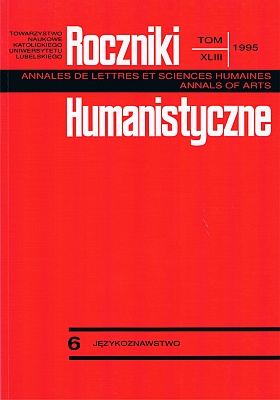Podstawowe honoratiwa we wczesnych komediach Aleksandra Fredry
Abstrakt
The term “honorary names'' denotes words, groups of words and grammatical forms of words whose aim is to honor the addressee (recipient) of an utterance or the third person, irrespectively how this honored person is evaluated by the transmitter of an utterance and what is his emotional attitude to the recipient. The principal honorary names are various titles, first of all pan (sir), and personal forms of the predicate, when the sentence's subject is the addressee (second or third person singular or plural). The author has examined 18 A. Fredro's comedies of the years 1818-1835.
The first short part of the study presents the titles honoring the third person (not the addressee): pan, pani (lady, Mrs, Ms) and panna (Miss) before the second name, first name or some title (e.g. szambelan [chamberlain!, szambelanowa [ lady chamberlain], hrabia (count), hrabina |countess), książę pan [master prince], and księżna pani (lady princess] (here pan and pani follow the title), panicz (young master] in the sense of “a young son of wealthy Mr and Mrs X] (more often in the sense “młokos" [hobbledehoyl or “podejrzane indywiduum" [suspect individual]), jegomość (the Honorable Gentleman], jejmość [the Honorable Lady], ichmość [the Honorable Gentleman], imć [the Honorable Gentleman] which precede the surname.
The extensive second part deals with the ways how to manifest kindness towards the second person, i.e. the addressee. The author deems it necessary to distinguish three elements in an utterance: 1) honor- ific vocative phrase, e.g. panie Janie [Sir John], pani dobrodziejko |Madam], mościa panno |Honorable Lady]; 2) second-person nominal elements, i.e. the pronouns ty [youl and twój, twoja, twoje [your] and nouns (titles) used in place of these pronouns in the composite functions of the subject, complement, possessive attributes and predicative word and 3) personal form of the predicate when the sentence's subject is the addressee. For instance in the utterances Jak się waćpan nazywasz, panie oberżysta? [And what is your name sir, master inn-keeper?]. Here the vocative phrase is panie oberżysta [master inn- keeper], and the subject is waćpan [sir]; in the phrase Panno Zuzanno, jestem ojcem waćpanny, wiesz o tym waćpanna? (Miss Zuzanna. I am your father, don't you know about it?] the vocative phrase is panno Zuzanno (Miss Zuzanna], the possessive attribute in the first sentence is waćpanny (your] and the subject in the second sentence is waćpanna [you]; the predicates with the subjects waćpan [sir] and waćpanna [miss] (honoring the addressees) bear the form of the second person singular.
In the period when the comedies under study were written the old titles waćpan [sir], waćpani |lady 1 and waćpanna [miss] and waszmość, waszeć, wasze, waść, wacan [sir] disappear in the language of culture, and in their place enter the titles pan [sir], pani [madam] (in the function of second-person nominal elements of a sentence); the predicate in the form of the third person singular comes into use (widzisz pan (?) [you see, sir (?)] turns into widzi pan (?) [you see, sir (?)], and zrób pan (do it] into niech pan zrobi [do it]).
The two comedies Gwałtu, co się dzieje! |Good heavens, what is going on!] and Zemsta |Revenge] do not contain the title waćpan [master] used at the turn of the 18th and 19th centuries, what should be regarded as archaic (the action in Good heavens takes place “a hundred years ago", and the action of Revenge in some vague past). The use of mości and mościa before the names and surnames here is also an archaism: mości Błażeju (master Błażej], mościa Urszulo |madam Urszula], mości Papkin. It is interesting that in Good heavens in relation to a nobleman the title waszmość is used and in relation to a townsman waszeć, wasze and waść.
Copyright (c) 1995 Roczniki Humanistyczne

Utwór dostępny jest na licencji Creative Commons Uznanie autorstwa – Użycie niekomercyjne – Bez utworów zależnych 4.0 Międzynarodowe.





